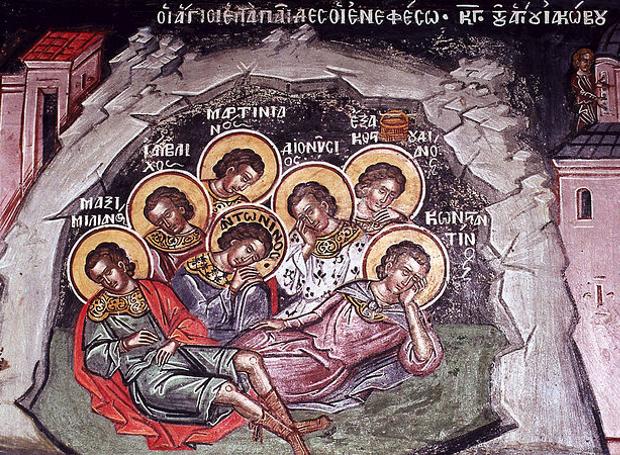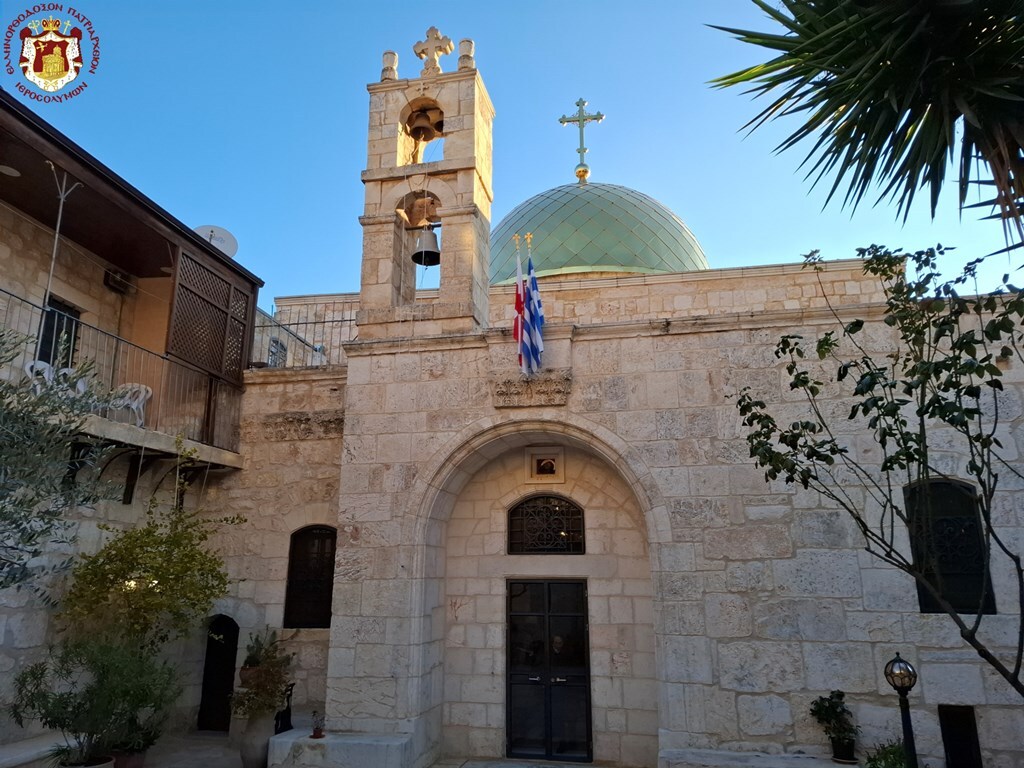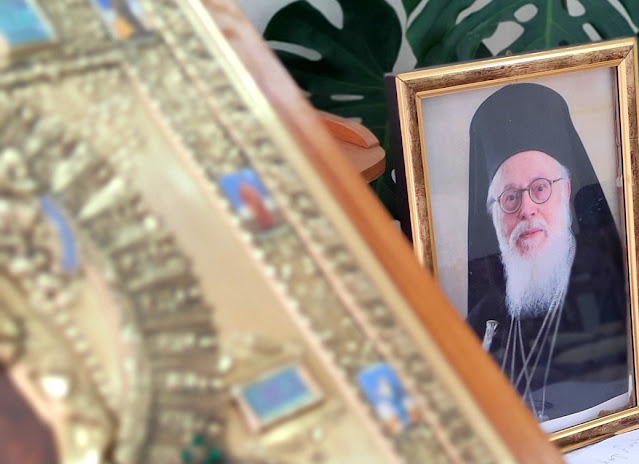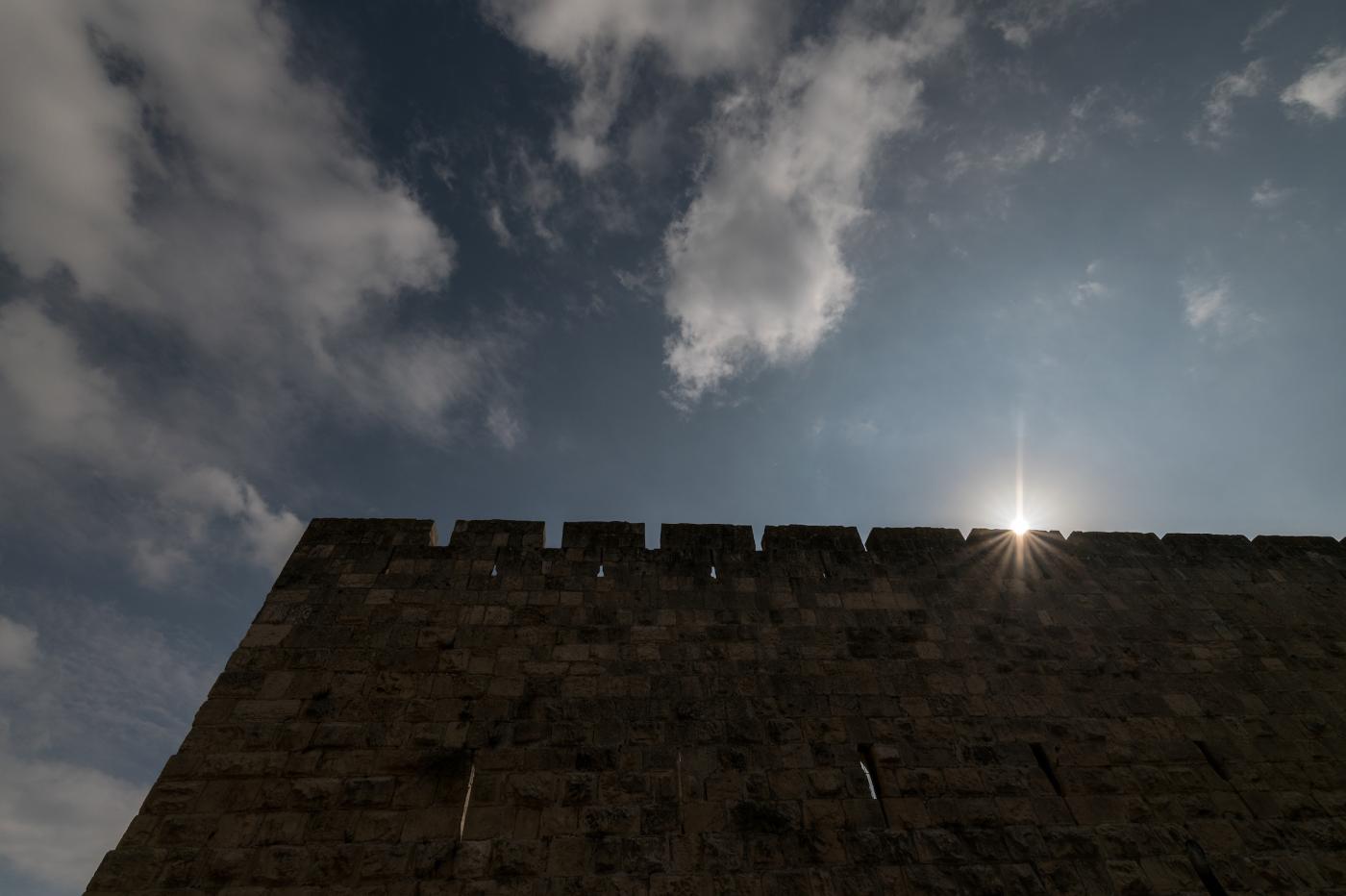Seven Holy Youths of Ephesus (4 August)


The Seven Youths of Ephesus: Maximilian, Iamblicus, Martinian, John, Dionysius, Exacustodianus (Constantine) and Antoninus, lived in the third century. Saint Maximilian was the son of the Ephesus city administrator, and the other six youths were sons of illustrious citizens of Ephesus. The youths were friends from childhood, and all were in military service together.
When the emperor Decius (249-251) arrived in Ephesus, he commanded all the citizens to offer sacrifice to the pagan gods. Torture and death awaited anyone who disobeyed. The seven youths were denounced by informants, and were summoned to reply to the charges. Appearing before the emperor, the young men confessed their faith in Christ.
Their military belts and insignia were quickly taken from them. Decius permitted them to go free, however, hoping that they would change their minds while he was off on a military campaign. The youths fled from the city and hid in a cave on Mount Ochlon, where they passed their time in prayer, preparing for martyrdom.
The youngest of them, Saint Iamblicus, dressed as a beggar and went into the city to buy bread. On one of his excursions into the city, he heard that the emperor had returned and was looking for them. Saint Maximilian urged his companions to come out of the cave and present themselves for trial.
Learning where the young men were hidden, the emperor ordered that the entrance of the cave be sealed with stones so that the saints would perish from hunger and thirst. Two of the dignitaries at the blocked entrance to the cave were secret Christians. Desiring to preserve the memory of the saints, they placed in the cave a sealed container containing two metal plaques. On them were inscribed the names of the seven youths and the details of their suffering and death.
The Lord placed the youths into a miraculous sleep lasting almost two centuries. In the meantime, the persecutions against Christians had ceased. During the reign of the holy emperor Theodosius the Younger (408-450) there were heretics who denied that there would be a general resurrection of the dead at the Second Coming of our Lord Jesus Christ. Some of them said, “How can there be a resurrection of the dead when there will be neither soul nor body, since they are disintegrated?” Others affirmed, “The souls alone will have a restoration, since it would be impossible for bodies to arise and live after a thousand years, when even their dust would not remain.” Therefore, the Lord revealed the mystery of the Resurrection of the Dead and of the future life through His seven saints.
The owner of the land on which Mount Ochlon was situated, discovered the stone construction, and his workers opened up the entrance to the cave. The Lord had kept the youths alive, and they awoke from their sleep, unaware that almost two hundred years had passed. Their bodies and clothing were completely undecayed.
Preparing to accept torture, the youths once again asked Saint Iamblicus to buy bread for them in the city. Going toward the city, the youth was astonished to see a cross on the gates. Hearing the name of Jesus Christ freely spoken, he began to doubt that he was approaching his own city.
When he paid for the bread, Iamblicus gave the merchant coins with the image of the emperor Decius on it. He was detained, as someone who might be concealing a horde of old money. They took Saint Iamblicus to the city administrator, who also happened to be the Bishop of Ephesus. Hearing the bewildering answers of the young man, the bishop perceived that God was revealing some sort of mystery through him, and went with other people to the cave.
At the entrance to the cave the bishop found the sealed container and opened it. He read upon the metal plaques the names of the seven youths and the details of the sealing of the cave on the orders of the emperor Decius. Going into the cave and seeing the saints alive, everyone rejoiced and perceived that the Lord, by waking them from their long sleep, was demonstrating to the Church the mystery of the Resurrection of the Dead.
Soon the emperor himself arrived in Ephesus and spoke with the young men in the cave. Then the holy youths, in sight of everyone, lay their heads upon the ground and fell asleep again, this time until the General Resurrection.
The emperor wanted to place each of the youths into a jeweled coffin, but they appeared to him in a dream and said that their bodies were to be left upon the ground in the cave. In the twelfth century the Russian pilgrim Igumen Daniel saw the holy relics of the seven youths in the cave.
There is a second commemoration of the seven youths on October 22. According to one tradition, which entered into the Russian Prologue (of Saints’ Lives), the youths fell asleep for the second time on this day. The Greek Menaion of 1870 says that they first fell asleep on August 4, and woke up on October 22.
There is a prayer of the Seven Sleepers of Ephesus in the Great Book of Needs (Trebnik) for those who are ill and cannot sleep. The Seven Sleepers are also mentioned in the service for the Church New Year, September 1.
The Seven Youths hid themselves in a certain cave near Ephesus in the year 250, to escape the persecution of Decius. By divine grace, a sleep came upon them and they slept for 184 years, until the reign of Saint Theodosius the Younger, when the doctrine of the resurrection was being assailed by heretics. They then awoke, that is, were resurrected, confirming in the sight of all the bodily resurrection; and again after a short time, by divine command, they reposed in the Lord in the year 434.
There was a great persecution of Christians during the reign of Decius. The emperor himself went to Ephesus, and there arranged a boisterous and noisy celebration in honor of the lifeless idols–as well as a terrible slaughter of Christians. Seven young men, soldiers, refrained from the impure offering of sacrifices. They earnestly prayed to the one God to save the Christian people.
They were the sons of the most influential elders of Ephesus. Their names were Maximilian, Jamblicus, Martin [Martinian], John, Dionysius, Exacustodianus, and Antonin [Antoninus]. When they were accused before the emperor, they retreated to a hill outside of Ephesus called Celion, and there they hid in a cave. When the emperor learned of this, he commanded that the cave be walled shut. Yet, God–according to His far-reaching providence–caused a miraculous and long-lasting sleep to fall upon the young men. The imperial courtiers Theodore and Rufinus (themselves secret Christians) built a small copper box into the wall.
It contained lead plaques on which were written the names of these young men, and which recorded their martyric deaths during the reign of Emperor Decius. More than two hundred years passed. During the reign of Emperor Theodosius the Younger (408-450 A.D.), there was a great dispute about the resurrection of the dead, and there were some that doubted in it. Emperor Theodosius was in great sorrow as a result of this dispute among the faithful, and prayed to God that He, in some way, would reveal the truth to men. Then some shepherds of Adolius, who owned the hill Celion, were building folds for their sheep, using stones from the cave. They removed stone after stone. Suddenly, the youths awoke from their sleep, as youthful and healthy as on the day they fell asleep.
The news of this miracle was spread abroad in every direction, so that Theodosius himself came with a great entourage and conversed with the youths, to his delight. After a week, they again fell into the deep repose from which they had awakened, to await the General Resurrection. Emperor Theodosius wanted to place their bodies in gold caskets; but they appeared to him in a dream, and told him to leave them in the earth as they had been laid there.
Apolytikion of Holy 7 Youths of Ephesus
Fourth Tone
Thy Martyrs, O Lord, in their courageous contest for Thee received as the prize the crowns of incorruption and life from Thee, our immortal God. For since they possessed Thy strength, they cast down the tyrants and wholly destroyed the demons’ strengthless presumption. O Christ God, by their prayers, save our souls, since Thou art merciful.
Kontakion of Holy 7 Youths of Ephesus
Fourth Tone
They that scorned all things in the world as corrupted and found the gifts that nothing ever corrupteth, behold, they died, and yet corruption touched them not. Wherefore after many years once again they all rose up, burying all unbelief of malicious revilers. Ye faithful, let us laud the seven youths with hymns of praise on this day, while extolling Christ.
Source: oca.org / goarch.org / westserbdio.org





